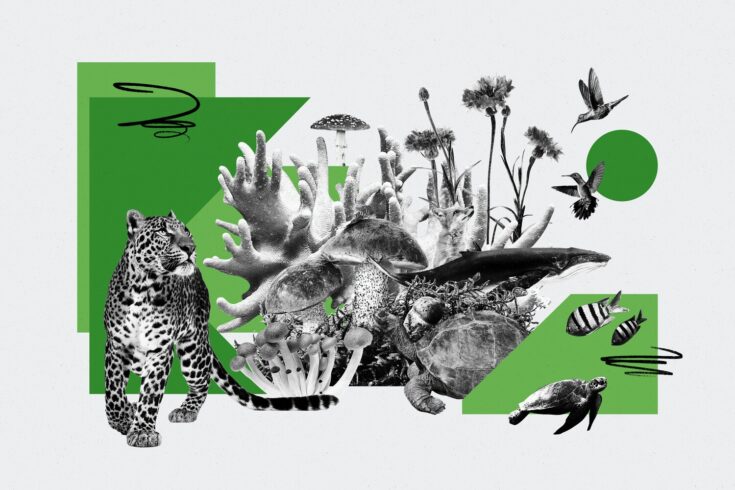Did you know that nature is worth more than £1.2 trillion to the UK economy? Or that more than half of the world’s gross domestic product, a staggering $44 trillion, depends on nature’s biodiversity?
Biodiversity is the variety of all living things. We need it to survive, from the food we eat, to the air we breathe and the water we drink. Biodiversity supports the economy, and it is declining at an alarming rate.
The World Economic Forum puts loss of biodiversity in the top three global risks and the UK government Green Finance Strategy recognises it as a financial risk.
When it comes to thinking about our economy and deciding on financial investments, the value of biodiversity is hard to figure out. But, not embedding it in our financial and economic systems comes with a cost to society and our planet we can no longer afford.
The United Nations COP15 Biodiversity Conference is crucial especially as the 2020 goals were not met. Governments from around the world will agree new global goals (Post-2020 Global Biodiversity Framework), to guide businesses, finance and civil society, on using biodiversity and the actions needed by 2030 to preserve and protect it.
I believe research and innovation can play a big part in the solution. So, how can they do that?
Finance should protect nature
The finance system has a key role in shaping how the global economy responds to the intertwined challenges of biodiversity loss and climate change. We must unlock private finance that protects nature and disincentivises harm.
The Treasury‘s Dasgupta Review recommends embedding considerations of biodiversity in how we think about, act on and measure economic growth and prosperity.
The recent Nature of Business UK survey found the majority of business leaders want to take steps to tackle biodiversity loss, but progress has been slow because they do not know how to proceed with meaningful actions.
Business and finance leaders want to act
I know from working on green finance initiatives with experts in the finance sector that financial institutions and companies want better information.
Having access to decision-grade data will allow them to incorporate biodiversity-related risks and opportunities into their strategic planning alongside climate, risk management and asset allocation decisions.
Businesses also want to understand how biodiversity helps them and how their activities impact it, including across their global supply chains.
The Taskforce on Nature-related Financial Disclosures is one important initiative developing guidance on how businesses can report and act on the risks and opportunities. It expects to produce its first full guidelines and recommendations in September next year.
Bridging the gap through research, innovation and partnerships
So, where do UK Research and Innovation (UKRI) and councils such as Natural Environment Research Council (NERC) come in?
UKRI is well placed to bring together world-leading UK experts in environmental sciences, finance, social sciences and economics.
Our recently launched NERC and Innovate UK integrating biodiversity: nature positive futures recognises that co-design and partnership across researchers, finance sector, business and policy is a must. It will support a holistic approach to fill the knowledge gaps and working in partnerships help develop the solutions needed to embed the values of biodiversity into finance.
We are also supporting 7 novel interdisciplinary projects through a £6.4 million NERC-ESRC economics of biodiversity research programme. These will provide improved understanding of the important economic value and benefits of biodiversity.
The University of Exeter’s ‘Renewing biodiversity through a people-in-nature approach’ project with the National Trust and Confederation of British Industry is 1 of 4 exciting awards under our £10 million changing the environment initiative.
One aim of the project is to develop new tools and standards for embedding biodiversity renewal in finance and business activities to enable better and biodiversity friendly decision-making.
Investing in a nature-positive and net zero future
This approach of drawing together different groups and disciplines to provide solutions to environmental challenges is fundamental to UKRI. It is why I chose to work at NERC.
It’s both exciting and a privilege to work with great UKRI colleagues and experts across a range of sectors from academia to finance and help drive the development of this emerging and interdisciplinary area of ‘greening finance’ for NERC and UKRI.
We are looking to learn and build on investments such as Nature Positive Futures and complementary initiatives such as the NERC and Innovate UK £10 million UK Centre for Greening Finance and Investment. This centre was established to accelerate the adoption by financial institutions of climate and environmental data and analytics.
I believe that the much-needed shift to an economic prosperity that comes from preserving biodiversity and the natural environment depends on meaningfully embedding these values into financial and business decision-making and investment choices.
Collaborations between the worlds of finance, research and innovation will accelerate the change we all need to restore and protect our biodiversity for a more resilient planet and economy.
Sir Roger Gifford, former Chair of UK’s Green Finance Institute (UK) (July 2019):
The health of our planet and the health of our financial system is inextricably intertwined. Finance has the power not only to change our economy, but also the way we live – and the time to act is now.
Top image: Credit: UK Research and Innovation




